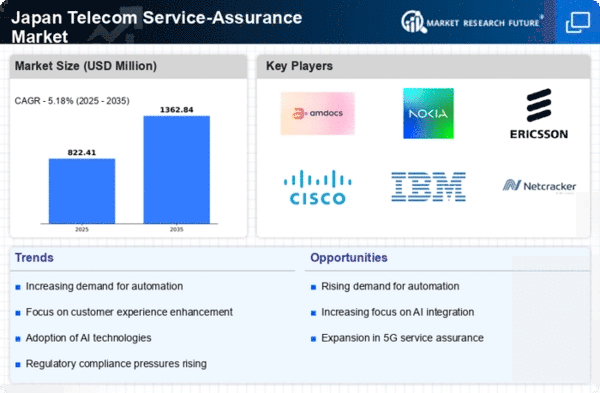Rising Demand for High-Speed Connectivity
The increasing demand for high-speed connectivity in Japan is a primary driver for the telecom service-assurance market. With the proliferation of smart devices and the Internet of Things (IoT), consumers and businesses alike require robust and reliable network performance. According to recent data, the number of IoT devices in Japan is projected to reach over 1 billion by 2025, necessitating enhanced service assurance solutions. Telecom operators are compelled to invest in advanced monitoring and management tools to ensure optimal service delivery. This trend indicates a growing need for proactive service assurance strategies that can address potential issues before they impact users. As a result, this market is likely to experience significant growth, driven by the necessity for seamless connectivity and user satisfaction.
Regulatory Changes Promoting Service Quality
Regulatory changes in Japan are increasingly promoting service quality, which acts as a catalyst for the telecom service-assurance market. The government has implemented various policies aimed at enhancing consumer protection and ensuring fair competition among telecom providers. For instance, regulations mandating transparency in service quality metrics compel operators to adopt comprehensive service assurance frameworks. This regulatory environment encourages telecom companies to invest in advanced monitoring and reporting systems to comply with new standards. As a result, the telecom service-assurance market is likely to expand as operators seek to align their services with regulatory expectations, ultimately benefiting consumers through improved service quality.
Increased Competition Among Telecom Providers
The competitive landscape among telecom providers in Japan is intensifying, which serves as a significant driver for the telecom service-assurance market. As companies strive to differentiate themselves, they are increasingly focusing on service quality and reliability. Recent statistics suggest that the market for mobile services in Japan is expected to grow at a CAGR of approximately 3.5% through 2025. This competition compels telecom operators to adopt advanced service assurance solutions to enhance their offerings and retain customers. By implementing sophisticated monitoring systems, providers can ensure that they meet or exceed service level agreements (SLAs), thereby improving customer satisfaction and loyalty. Consequently, the telecom service-assurance market is likely to benefit from this heightened focus on competitive service delivery.
Technological Advancements in Network Infrastructure
Technological advancements in network infrastructure are driving the evolution of the telecom service-assurance market in Japan. The rollout of 5G technology is particularly noteworthy, as it promises to deliver unprecedented speeds and lower latency. As telecom operators upgrade their networks to support 5G, they face new challenges in maintaining service quality. Data indicates that 5G subscriptions in Japan are expected to surpass 50 million by 2025, creating a pressing need for effective service assurance mechanisms. These advancements necessitate the deployment of sophisticated analytics and monitoring tools to ensure optimal performance. Therefore, the telecom service-assurance market is poised for growth as operators seek to leverage these technologies while ensuring high-quality service delivery.
Growing Importance of Data Analytics in Service Management
The growing importance of data analytics in service management is a crucial driver for the telecom service-assurance market in Japan. As telecom operators collect vast amounts of data from network operations, the ability to analyze this data effectively becomes paramount. Advanced analytics can provide insights into network performance, customer behavior, and potential service disruptions. Recent studies indicate that companies leveraging data analytics in their operations can improve service efficiency by up to 30%. This trend suggests that telecom operators are increasingly adopting analytics-driven service assurance solutions to enhance operational efficiency and customer satisfaction. Consequently, the telecom service-assurance market is expected to grow as operators recognize the value of data-driven decision-making.
















